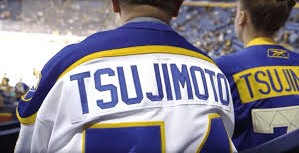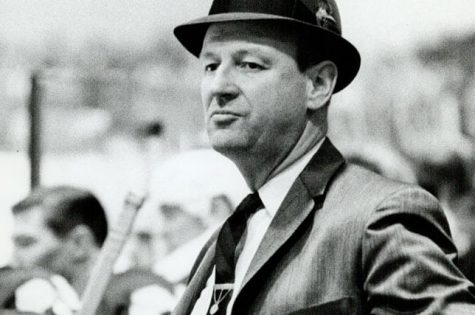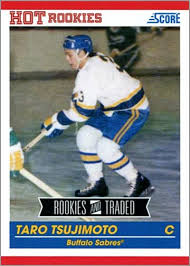Taro Tsujimoto: The Legend That Never Was

February 4, 2020
In 1974, the NHL’s Buffalo Sabres chose an unlikely player for their 11th round pick. Coming 6,700 miles away from the NHL HQ in New York City, this player was set to not only be a star but the first Japanese player in the NHL. However, this Japanese player never got one goal, not a single shot, nor a single second of ice time. How is that so?
First, we need to know some backstory between the NHL and the WHA. Ever since the WHA was founded, they were bitter rivals with the NHL. On one hand, you have the NHL. The biggest and most popular hockey league in the world. On the other, you have the WHA; a small and mostly unknown hockey league with very few star players. However, internal feuds of the NHL and the deep pockets of the WHA led to 67 players, including Gordie Howe and Bobby Hull, leaving the NHL for the WHA. This led to the NHL’s draft picks to  remain very private. So private, that it was until after the WHA merged with the NHL that draft picks were able to be chosen in front of the general public.
remain very private. So private, that it was until after the WHA merged with the NHL that draft picks were able to be chosen in front of the general public.
The draft picking process before the merge was, to put it simply, difficult. Coaches and GM’s would have to communicate with the NHL HQ via phone during their draft pick. This was done so picks wouldn’t be leaked to the WHA. The head coach of the Buffalo Sabres, Punch Imlach, was not a fan of this system. Finding it tedious to have to go through twenty-five rounds with the process, Imlach decided to play a prank on the NHL.
Imlach decided to create a fake player to draft into the league. However, this wouldn’t be easy. This is because Imlach couldn’t make the player be from Canada or the U.S.A. If he had done so, the league could easily check to see if he’s real and uncover Imlach’s prank easily. To overcome the aforementioned, Imlach decided to make his player come from Japan where NHL teams would never scout for players.
 Imlach got help from Paul Wieland to pull off this prank. Wieland was the Sabres PR Manager, but, more importantly, gave Imlach the perfect name.
Imlach got help from Paul Wieland to pull off this prank. Wieland was the Sabres PR Manager, but, more importantly, gave Imlach the perfect name.
Back in Wieland’s college days, he would occasionally pass by the Tsujimoto Grocery Store. For whatever reason, the name “Tsujimoto” remained in Wieland’s head. Upon hearing the name, Imlach immediately contacted the owner of the store, Joshua Tsujimoto. With Mr. Tsujimoto’s permission, Imlach used his family name for his artificial
player. Then, Imlach asked for popular Japanese names. Suggestions flew by Imlach before he decided on the name that literally means, “firstborn male,” or Taro. Taro Tsujimoto.
At this point, Imlach’s plan was going perfectly. Now all he needed was a fake team for Taro Tsujimoto. Because using a real team name would further lead to Imlachs plan to be foiled, he instead made up a fake one. Using his creativity, Imlach decided Tsujimoto would’ve played for the Tokyo Katanas. Imlach had seen the Japanese katana as a perfect equivalent to the more Western saber. Literally, that meant the fake team Tsujimoto played for was the Tokyo Sabres.
Having a fake name and a fake team, Imlach had constructed the first fake NHL player in history. Now, it was time to draft him.
During the 1974 draft, on the 11th round, Imlach chose Taro Tsujimoto from the Tokyo Katanas as the 183rd overall player. Surprisingly, the league was totally oblivious to his pick and continued with the draft.
1974-75 came and went and journalists were itching for news on the first Japanese player to know when he’d be brought up. However, Imlach would only give the simple answer that Tsujimoto was doing, “Great.” It went like this for a long time, but the league remained blind.
Imlach wanted nothing more to see the NHL embarrassed that they hadn’t noticed they had drafted a fake player. So, seeing as the NHL wouldn’t figure it out themselves, Imlach spilled the beans. Only one word could describe the NHL’s reaction to this revelation: furious. The NHL president immediately changed the 183rd overall pick in the 11th round to, “Invalid.” The NHL saw that if they didn’t fess up as soon as they could, they would be seen as a joke league of sorts.
Eventually, the NHL would see it’s first Japanese player, Yutaka Fukufuji, as a goalie. Like Tsujimoto, Fukufuji came from Tokyo, Japan.
However, Tsujimoto’s legacy still persists among fans of the Buffalo Sabres. Many fans have made jerseys branding the name “Tsujimoto” and the number “74” on the back. Also, fans frequently call for Tsujimoto’s star power whenever a game is lopsided against the Sabres. Even a trading card company recognized  Tsujimoto by making a card with an unidentified Asian player branding the name of “Tsujimoto.” To this day, the Buffalo Sabres still list Taro Tsujimoto among their alumni.
Tsujimoto by making a card with an unidentified Asian player branding the name of “Tsujimoto.” To this day, the Buffalo Sabres still list Taro Tsujimoto among their alumni.





Mark • May 11, 2020 at 10:12 am
I wanted to pass along a link for my biography of Taro Tsujimoto…
https://www.amazon.com/Legend-Taro-Tsujimoto-Unauthorized-Fictional/dp/0997831731/ref=mp_s_a_1_1?dchild=1&keywords=taro+tsujimoto&qid=1589220685&sr=8-1